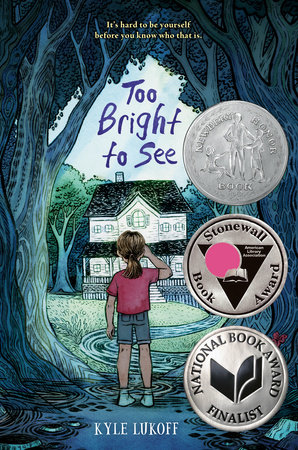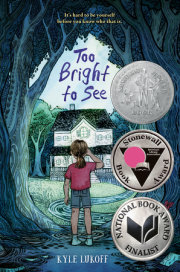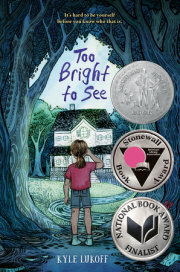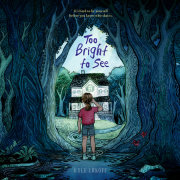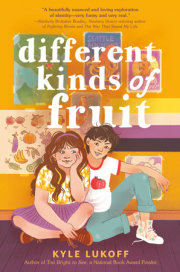PROLOGUE
It’s strange living in our old house, now that Uncle Roderick is dead.
I already know my house is haunted. It’s always been haunted. That hasn’t changed. We avoid the freezing cold spot in the corner of the living room because someone probably died there. Windows slam themselves open or shut on the stillest days. So do doors, and these doors are heavy. For a long time I thought it was normal to sense someone standing behind you, or next to you, and not be able to see them. For invisible hands to brush past your hair, your clothes.
And it looks haunted: wooden, unpainted, weathered with time. There’s an elaborately carved front door, peaked roofs jutting out in all directions, tall windows with shapes flickering behind them. The porch wraps around front to back with rocking chairs that sometimes rock on their own. We’re out in the middle of nowhere, and at nighttime there’s moonlight and starlight and nothing else. When I was in kindergarten I checked a book out of the library because the house on the front cover looked like a photograph of my home. Uncle Roderick tried reading it to me that night, my head resting on his chest, his arm tucked beneath my shoulders. We always read together before bed. He had to stop after the first chapter because it was a collection of scary stories; he believed that dreams were important, and he didn’t want to give me bad ones.
But now this old house seems haunted in a different way. A way that’s both more boring and more frightening. There’s a half-empty jar of okra Uncle Roderick picked and pickled that he’ll never finish eating, and Mom and I both hate okra. His winter boots are jammed in the closet. He always put off wearing them for as long as possible, saying they made him look like a lumberjack, but now he’ll never need them again. He subscribed to magazines, theNew Yorker, National Geographic, and they’ll keep being addressed to him until we tell them to stop. Until they take his name off the list. Forever.
I prefer the ghosts.
CHAPTER ONE
The moment he dies, I know. It’s the middle of the night. My eyes open, and I grip the mattress with both hands. I’m suddenly, irrationally convinced that my bed is toppling over. Like it’s unbalanced, perched precariously on the top of a mountain and about to come crashing down. Or like it’s teetering on the edge of a black hole, with nothing familiar on the other side.
Uncle Roderick’s room is at the top of the stairs. Mom’s is at the end of the hall. For eleven years I’ve fallen asleep snug in the middle, their warmth and weight keeping me grounded from both sides. Even these past couple months, when he’s been in the hospital and then the hospice, I could still feel him there, keeping me safe at the top of the stairs. But now I know my uncle is gone.
The stairs creak, sharp and loud. That doesn’t mean anything. They creak all the time. “The house is settling” is what Mom says, and sometimes it might be a harmless ghost. But now I hear the groan of a foot on a step. And then another. It’s like the sound of someone slowly moving up our wide staircase, someone with a heavy tread.
It’s mid-June, and hot, and I’m lying under a sheet with a fan blowing warm air around the room. I pull the sheet up to my chin, wishing for the weight of a comforter to press me into the mattress, something to hide under.
The creaks stop at the top, right in front of Uncle Roderick’s bedroom door. I hold my breath and strain my ears. I can’t hear anything, but it doesn’t sound like no one’s there. It sounds like someone being silent. I only exhale when the creaks descend the stairs, as slowly as they came.
Uncle Roderick always told me that passing spirits and lingering presences are a normal part of living in a house almost as old as the dirt it sits on. Mom says that the creepy things I sense or feel or hear are just part of an active imagination, and that Uncle Roderick shouldn’t encourage it, that ghosts aren’t real.
I only occasionally believe my mom: When the sun is bright and I can explain away strange hands touching my neck or a mysteriously slammed-shut door as stray gusts of wind in a drafty old building.
I believe my uncle now, surely and suddenly. But I don’t want to. “There’s no one on the stairs,” I tell myself, wanting it to be true, still holding on to the mattress for dear life. “There’s no one on the stairs. There’s no one on the stairs. There’s no one on the stairs.” The rhythm pounds through my brain, repeating itself over and over, crowding out every other thought that also must be true. I manage to fall asleep by curling up into a ball, my back turned toward the half of the room that echoes the new emptiness in my chest.
I wake up again a few hours later because the phone rings. I feel grounded now. Not in a free fall, not hurtling through space. But there’s an empty room inside my chest.
Mom’s voice struggles through the wall. None of the words are clear, but if I didn’t know about Uncle Roderick already, I would know now from her tone, the rise and fall of sentences. She comes into my bedroom a few minutes later and I sit up.
She holds me and cries. I’ve seen my mother cry before, but it’s never been my job to comfort her. It’s always been Uncle Roderick’s job. But her brother’s not here, and I am. I hold her tight, and breathe as shallowly as possible until her sobs subside. I should have cried that first day, almost a year ago, when Uncle Roderick came home from the doctor with bad news, but I couldn’t. I remember a rushing sound filling my ears, drowning out the details, my brain refusing to take in anything beyond one main truth. Something too big to touch, with no details to snag on. I told myself I’d only cry once he was gone. But that day has come and I’ve got nothing. No tears, and no anything else. There’s sadness, but it’s whirling around outside of me. Like a hurricane of grief, and I’m the dry, unmoving eye.
“He loved you very much, you know,” Mom says, after a bit. She lets go, sits up straight, palms the tears off her cheeks. I wish I had a tissue to offer her.
“I know he did,” I say. And I do. But it doesn’t help. Mom hugs me once more, then says she has to make some phone calls. I stare across my room, sunlight streaming through the tall window with rippled glass, and wonder what happens after this.
CHAPTER TWO
Mom and Uncle Roderick and I rattled around our house like peas in an oversized pod. Sometimes we would have houseguests from New York City or Burlington or Montreal, filling it up with noise and laughter and memories. But the three of us could fill it up just as well.
Tonight the house is full of people and memories, but not much laughter. Family friends have come from all over. But not many people from our little pocket of Vermont show up. We moved here when I was a baby, and old Vermonters don’t acknowledge you until there’s “six in the ground.” Six dead people, they mean, in a row, stretching back through the years. Well, we’ve got our first.
But Uncle Roderick isn’t even in the ground. Not really. He didn’t want a funeral, he said, or a burial.Just sprinkle my ashes on the land, he told us toward the end. We did, putting handfuls in the creek, the woods, the garden, everywhere.
Mom says that everyone deserves a chance to say goodbye. I wish they could say goodbye somewhere else. The house has never been this full before, and I can’t go hide with Uncle Roderick in his room. I have to wear this dress that makes me look like Samantha from the American Girl books. It’s rumpled from being at the bottom of my closet for months, and Uncle Roderick usually took care of the ironing.
People pat me on the shoulder or hug me, and since I’m the one with a dead uncle it’s okay that I don’t hug back. My dress is like a force field; it blocks out the pressure of their hands or arms around me, which is good because if I actually feel anyone touch me I’ll break apart into smithereens. In between I focus on tightening my ponytail and tugging at the wrinkles in my dress. It’s too small for me, and if I hunch forward the material pulls across my back, keeping me a gasp away from a full breath.
Conversations pause if I walk by them, but tucked into a corner of the living room I catch snatches here and there.
“Awfully young, he was only thirty-two, right?”
“It’s so sad, especially since Sabrina’s husband died right after she gave birth. A car accident, if I’m remembering correctly.”
“No, they don’t have anyone else. This place started out as a vacation home, and it’s been in their family for a while, but no one else is left.”
One of Uncle Roderick’s ex-boyfriends is across the room, down from Portland. I think his name is Tobias. He’s tall and thin, like Uncle Roderick, but with a shaved head and a beard. He was nice, but had wanted kids, and my uncle decided that I was enough kid for him, so they broke up but stayed friends. Tobias catches my eye and gives me a small, sad smile. I turn up the corners of my mouth in what might be a smile, and skitter away before he can come over to shake my hand or hug me or pay whatever respects he has.
I duck into the kitchen but catch my dress on the doorframe. I reach down to tug it away, from a nail or whatever. It’s not stuck on anything, but there’s a rip that I don’t think was there before. Oh well, I’m getting too big for it anyway.
No one else is in the kitchen. There are dishes cluttered on the wide wooden counter, crusted with food, so I dump them in the sink and turn on the faucet. I’ve always begged Mom for a dishwasher, especially since I only just got tall enough to reach the bottom of the huge sink, but right now scrubbing at dishes in hot soapy water quiets the jangling in my brain. I start planning out what I need to pack for summer camp, and have gotten into a rhythm of washing and rinsing when I look up at the window behind the sink.
A strange face stares back at me, darkly reflected in the glass.
I yelp, jump back, and a glass slips out of my hand and crashes onto the kitchen floor. A second later the kitchen door swings open.
“You okay, Bug?” a voice calls out. Mo. My best, or oldest, or only friend. She and her mom showed up a while ago, but I haven’t said hi yet.
The dress is still pulling on my back and shoulders. “Fine,” I say. I can’t figure out how to get my mouth to say more than that. I grab at a broom and dustpan to hide my shaking hands.
This happens a lot. I’ll be minding my own business, in the bathroom or kitchen or wherever, and catch a glimpse of something in the mirror that isn’t me. Not a blood-dripping evil face, or anything obviously supernatural. Just a face that isn’t quite mine. Almost mine. But different enough that it gives me a shock every time. Another part of living in a haunted house, I guess. Except it doesn’t happen only when I’m at home.
Mo always makes me swear that she won’t get attacked by ghosts when she spends the night at my house. I always promise, but that’s because ghosts don’t attack people. Don’t notice people, even. They’re in their own world, whatever that is, and we’re in this one. The only times we overlap are like how if you look into a bright light for too long you see it even after you look away, even when you close your eyes. It’s not in front of you, but it still leaves an impression.
Mo has never even seen one of those. She’s scared of coming across a tall woman in a bloodstained wedding gown, or a pale little boy with a bad smile, but doesn’t notice when her hair is caught in a nonexistent breeze or a room’s mood shifts while it remembers something. I don’t tell her when it happens, because Mo’s the only person who’s willing to sleep over in the first place.
I finish sweeping and lean back against the kitchen island. Mo hops onto it next to me. I can tell she’s struggling to come up with something to say. She always has something to say, and right now I don’t want to listen, but it’s nice, or something, of her to try.
“Where did that dress come from?” she asks finally. “I’ve never seen it before.”
It’s better than asking how I am doing. There’s no good answer. I wonder if she knows better than to ask that, or if she’s actually curious about the dress. I’d rather not talk about anything, just moving my mouth feels hard, but I don’t want Mo to start chattering away, which is what she usually does if I don’t keep up my end of a conversation.
“I don’t remember. It’s old.” My voice surprises me. It sounds normal. “Mom said I might need a dress for some occasion. I look like my old Samantha doll.”
“Ha, yeah, you do. I still have my Felicity somewhere. Remember when we would make up whole stories with them? Yours always involved pirates or kidnappings or something. I always wanted to take them to balls. And then we would compromise! Pirate ball or glamorous kidnapped princess.”
I just nod, and look down at the puffy skirt. It really does look more like a costume than a dress. Mo looks like she’s going to a funeral instead of our house, in a smooth dark skirt and matching top. Her bright red hair is in a tight braid, not loose and frizzy like normal. She’s a few months younger than me, but she looks almost like an adult today. Almost like a woman. I just look like a doll. Quiet, stiff, and blinking.
“We have to go,” she says after a minute of silence. “I just came in to say goodbye. I’ll see you soon, though. And . . . um, I’m so sorry.” She leans in to hug me, and I manage to lift my arms and squeeze her back for a second, before it becomes too much. She’s always been the type to put her arms around her other friends, play with their hair, a casual affection that has always seemed impossible to me. I’m never sure how bodies are supposed to interact. I feel like I’m hugging a scarecrow. Or more that I’m a scarecrow being hugged. Mo gives me an awkward pat on the back before pushing her shoulder against the swinging kitchen door. Her skirt doesn’t catch on anything.
I go back to the sink and start washing dishes again. The kitchen has always been my favorite room in the house. It’s where I watched Uncle Roderick bake cookies and can vegetables, experiment with new recipes. And it’s kind in here. Safe. I imagine what I must look like, a girl with long hair pulled back, a torn dress, scrubbing away like a servant girl in a royal palace, and thinking about that girl and imagining her life keeps me distracted from what is actually happening. The soapy water has gone cold, and I finish up without looking at the window again.
CHAPTER THREE
Some guests stay for a few days after the memorial. I make myself useful, dodging questions about how I’m holding up by doing endless loads of dishes and laundry. I pretend to be a character in a book, sometimes an abused but brilliant servant girl, sometimes a spy at a seedy hotel, sometimes a princess mistaken for a commoner. It’s fun. Kind of. It’s something I’ve always done. Girls in books always seem more real than real life, and making believe that I’m in a story keeps my mind off of what I really am, which isn’t much.
It takes a couple days, but finally everyone goes back to where they live. Big cities, for most of them. I was born in Brooklyn, but Mom moved us here when I was only a few months old. After my dad died she says she didn’t know how to stop one life (married, no kids) and start a new one (widowed, kid) without going all the way. Without making another huge change.
Uncle Roderick came with her. “I never thought it was going to be permanent,” he told me last year, while we were picking blueberries. He’d use them in a pie later, but I was eating mine right off the bush. “We would vacation up here when we were kids, but neither of us had any reason to stay in Vermont. I thought we’d spend a couple years, she’d heal from the loss of your dad, and then we’d go back. But kids root you to a place. It’s like we grew down into this earth, instead of growing up from it.”
The biggest city I’ve been to is Burlington, on a school field trip. I learned that Burlington is the smallest biggest—the biggest city in the state, and the smallest city with that distinction. It felt huge to me, people everywhere I looked, stores on top of stores on top of stores. Uncle Roderick talked about bringing me to New York, but we never made it. I don’t think I’ll ever visit now.
It’s morning, the house is empty of everyone except Mom and me, and I’m staring at Uncle Roderick’s carved wooden tea cabinet, perched below the spice rack. Dying for a cuppa, like they say in old books from England. I don’t know any other eleven-year-olds who drink tea, but Uncle Roderick started making it for me, mostly honey and milk, once I graduated from sippy cups. I know there’s a half-full drawer of jasmine in there, and I miss the weight of a heavy mug warming my hands. The comfort of sipping at something hot and sweet. But I can’t bring myself to boil water, ease open the rickety drawer, measure leaves into a tea ball, steep it properly. Too many steps.
I pour myself a glass of juice instead and fix a bowl of cereal. Mom shuffles in, still wearing her robe, looking like she hasn’t slept for weeks.
“Thank you for being so helpful these past few days, sweetheart,” she says, her voice thick with sleep or grief or both. “You’d make a great scullery maid.”
“I know,” I mumble. My throat closes around any other words. Normally we’d launch into some conversation about what chores you wouldn’t want to do in a medieval castle, or I’d go into some dramatic monologue about working my fingers to the bone, but there isn’t any laughter in me. And it wouldn’t be the same without Uncle Roderick joining in, with a terrible attempt at an English accent or pretending to be better than me because he’s a chambermaid. I stir my spoon around the bowl, and Mom slips out to get the newspaper from the porch. There’s not much laughter in her either, and I know she only tried for me.
When she comes back she tosses the comics page down on the counter in front of me and makes herself some coffee. She’s never been much of a tea drinker, and I’m grateful for that.
I stare at the comics, not actually reading them. Smiling seems like it would hurt, like clay has dried on my cheeks and a twitch of my lips would crack it off. A prickling at the back of my eyes makes me look up. Mom has the paper spread out in front of her, but she’s looking at me like she has more bad news. She swallows hard when I meet her gaze. There are new lines etched around the corners of her mouth, and her eyes are red.
“I know we planned on sending you to camp again in July,” she begins softly, and I want to tell her to stop, I know where this is going. But she has that sad half smile on her face that I’ve seen a lot this past year, so I let her keep going. Mom and Uncle Roderick look so much alike, with shaggy, dirty-blond hair, green eyes, and pointy chins. My skin tans, while their paler skin burns. I have bluer eyes, a bigger nose, dark hair. My dad had dark hair. I keep mine long because it never needs cutting that way. I grab the base of my ponytail and squeeze, the pull on my scalp helping a little.
“Your uncle’s insurance covered a lot of his medical bills, but that last place he was in, the hospice, was very expensive. I don’t want you to worry; we’re not going to starve, but I’m afraid there isn’t much extra cash lying around. I promise I’ll do everything I can to help you have a fun summer, but camp is out of the question this year. Hopefully next year will be different. I’m so sorry, Bug.”
At camp we sleep in a hayloft and gather eggs for breakfast. We play endless games of capture the flag and hide-and-seek, go on midnight walks, canoe in the lake, everything. I’m not great at making friends, but something about the comfortingly consistent bad food, whole-day games of tag, the rainy days when we climb the rock wall in the gym, brings us all together in a way that school can’t. Kids come from all over New England, and it’s the only time in the year where I feel part of a larger group. I’ve gone every July since I was six, and stayed for the entire month the past two years. I loved Uncle Roderick, and I loved camp. Now I don’t have either.
“It’s okay,” I say. It isn’t, but it is. I should have guessed, after going with Mom to visit Uncle Roderick in the hospital. All those treatments and medicines couldn’t have been cheap, and he hadn’t worked for a long time, not since he got really sick. Mom has always been honest with me, and talking about money is part of that. I can’t whine about missing camp when I understand why. Besides, if I show Mom how upset I am it will only make her feel worse, which won’t make anything better. The cereal in my bowl is completely soggy now. There’s no way I can finish it. I had only eaten one spoonful anyway. I shove aside my barely touched breakfast and unread comics, and tell Mom that I’m going outside.
She pulls me into her arms as I walk past her, holding me tight. I don’t want to be hugged right now, but I know that this hug is for her, that I have to show her that I’m not mad, so I squeeze her until she lets go. Only then do I take a deep breath. It’s a beautiful day.
We own a lot of the land around my house. The backyard is a big grassy field, and beyond that is a patch of woods I’ve explored ever since I could walk. A creek runs through the woods, and I can spend entire days reading on a boulder near the water or splashing around trying to catch minnows. Uncle Roderick would walk through the woods with me and tell stories of the gnomes and fairies hiding just out of sight, or point out edible plants and poisonous berries. We would pack a picnic lunch and find shapes in the clouds, sit quiet and still and wait for snakes and squirrels to come out around us. It never felt lonely. He would sometimes joke about the big-city life he left behind, glamorous and loud and bright, but he loved filling our big house with restored antiques and chopping wood for winter fires.
My bike is stashed under the porch. I pull it out, brush a spider off the handlebar, and climb on. I pedal away from my house, trying to get up enough speed to catch the wind between my teeth. Then I remember Uncle Roderick teaching me how to ride, putting bandages on my knees and elbows when I fell. I remember following him into town on crisp fall days to visit the farmer’s market. I remember him showing me how to change the tire, our hands greasy and black and smelling like rubber and the earth. Something blunt and unstoppable tries to push its way up from my stomach into my throat and behind my eyes. I brake sharply, jump off, and walk back home, leaving my bike sprawled on the side of the dirt road, one wheel still spinning forlornly.
* * *
I go to bed early that night. Too sad to stay awake. I’m fast asleep until all at once I’m not. It’s like the night he died all over again, except instead of a suddenlack, a cold nothing where there was once a warm someone, now there’s . . . something else. My eyes are still shut tight, but someone is in my room. “Her eyes were shut tight,” I say in my head like a narrator, wondering what a girl in a book would do. “She knew it was just her imagination.” I try opening them, just barely, and peeking through my eyelashes, but it’s so dark. Dark enough that if I open my eyes a little more I’ll still be safe. I hope. I squint them open a crack more. And see it.
It? Him? Her? A tall, thin, dark shape looming in front of my closed door. Is it a shadow? Is it moving?
I’m silent. I’m so, so silent. It can’t know I’m awake. I’m not even breathing. And then I realize that I’ve stopped breathing. Sleep breaths are long and slow and steady and it knows I’m awake now. I see it, him, move toward me, and quick as anything I flip on the light next to my bed. I don’t know if I want to see, but light will help no matter what.
And nothing’s there.
It’s not the first time I’ve been scared in my house, at night. But it’s the first time I can’t scream and know that my uncle will come running.
When I was very little I had a lot of nightmares. Mom doesn’t wake up for anything, but Uncle Roderick would be by my side right away, talking me through it. He’d ask what I thought it meant, if it represented something I was afraid of in real life, what the dream was trying to tell me. And in discussing, it would fade from memory, completely forgotten in the morning.
I want to call for him now and know that he would come in, sit on the side of my bed, and tell me that ghosts are nothing to be afraid of. That they don’t even know we’re here, that we’re not even in the same world.
But he’s resting now. At peace. And I can’t help but think that this one felt different. It wasn’t in another world. It knew I was there, and it knew I was awake. But I don’t know what it wanted, and I don’t know why it left.
After that I can only sleep in fits and starts, but by morning I’ve almost managed to convince myself that it was only a dream. And even if it wasn’t a dream—even if there was something, some spirit in my room, it wasn’t really all that different from the wandering ghosts that are always whooshing around my house. They’ve never even paid attention to me. They’ve never hurt me before.
Copyright © 2021 by Kyle Lukoff. All rights reserved. No part of this excerpt may be reproduced or reprinted without permission in writing from the publisher.

